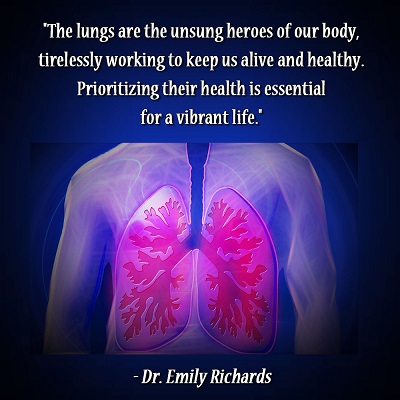 Breathe in, breathe out, breathe in, breathe out. Thankfully, breathing is something we do automatically. We don’t usually think about doing it until we find it hard to breathe, or something goes wrong with our lungs.
Breathe in, breathe out, breathe in, breathe out. Thankfully, breathing is something we do automatically. We don’t usually think about doing it until we find it hard to breathe, or something goes wrong with our lungs.
Our lungs are the major organs of our respiratory system, and their health plays a crucial role in our quality of life, which is why it’s important to improve your lung health while you can. If you do, you can reduce your risk of developing any lung-related illnesses.
Oxygen Intake and Carbon Dioxide Removal
The lungs help ensure that your body gets enough oxygen to function. The oxygen from the air passes into your bloodstream and is carried to every part of your body. We need a constant supply of oxygen because the body cannot store it, and if we don’t get enough oxygen, we can’t stay alive.
If we have healthy lungs, we get oxygen more efficiently, which means more oxygen is available for energy production. We need energy for everything that we do, from walking to thinking and sleeping.
If our lungs aren’t working as they should, they can’t breathe in the oxygen we need, which means less energy production. A lack of oxygen can make you feel tired and weak, and you will feel like you have no energy.
The lungs also remove the carbon dioxide from our body, which is a waste product of cellular metabolism involving oxygen. By breathing out, the lungs expel carbon dioxide, helping to keep our blood clean. If carbon dioxide levels become too high, it can make our blood too acidic, affecting our organ function and potentially causing harm.
Your Lungs Protect You From Germs and Infections
So you know your lungs help you to breathe, but did you know they also have their own special defense system to keep you healthy? This system is like having tiny, invisible guards inside your lungs, ready to fight off any germs that try to invade.
One type of guard in your lungs is the alveolar macrophage. These cells reside in the tiny air sacs where oxygen enters your bloodstream. Think of them as vigilant security guards, always on patrol. When they detect potentially harmful invaders like bacteria or viruses, they swiftly ingest and neutralize them, preventing them from causing harm.
Another crucial group of cells in your lungs are dendritic cells. These act as scouts, constantly scanning for anything unusual. When they encounter a threat, they swiftly relay the information to your immune system’s command center. Once your immune system understands the threat, it can take action to protect you.
Supporting Your Heart and Brain
You need healthy lung function for a healthy heart and a healthy brain. Two other very important organs! When your lungs function well, they efficiently supply oxygen to the heart, easing its workload, and provide oxygen to the brain which is vital for it too!
Heart Health
As you can imagine the respiratory and cardiovascular systems are closely intertwined. When you breathe in, your lungs absorb the oxygen, which is then carried by the blood to the heart. The heart pumps this oxygen-rich blood to nourish all parts of your body. However, if your lungs are unhealthy and unable to function properly, the heart must compensate by working harder to maintain adequate oxygen levels.
This puts extra stress on your heart and other organs because of all the extra work they have to do.
Brain Health
If your lung health is compromised, such as if you have a condition like chronic obstructive pulmonary disease (COPD) or asthma, the ability to supply sufficient oxygen to your brain diminishes. This reduction in oxygen can impair your cognitive abilities. You may experience difficulties concentrating and may feel mentally sluggish due to inadequate oxygen delivery to your brain.
Therefore, maintaining good lung health supports your heart function and cognitive function, and reduces the risk of cardiovascular problems and other serious health issues.
Your lungs are invaluable! They do so much more than take in oxygen. By taking proactive steps to care for your respiratory system, you can enhance your longevity, and resilience against illness, and improve your overall quality of life. Prioritize the health of your lungs today, so you can breathe better tomorrow and every day after that!






